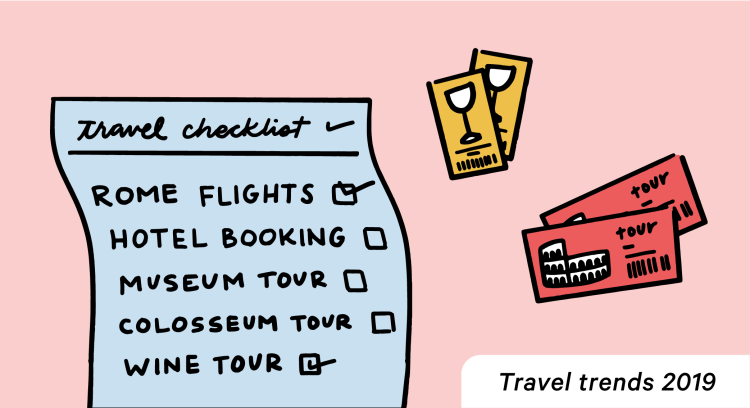How can a travel business become the one-stop shop for all parts of a trip?
This is the second in a series of posts about strategies, behaviors, and market realities that are shaping the travel industry’s future. (Read the first post about the three ways travel brands are driving direct bookings)

With the purchaseof HotelTonight, Airbnb plants its flag the comprehensive travel market and confirms a shift in the entire industry toward a one-stop shop for all travel purchases.
With access to thousands of hotels, the platform once known for home vacation rentals is pursuing more traditional accommodations alongside its marquee product. With its aim set on becoming an all-in-one travel service, Airbnb has also expanded into Airbnb Experiences to offer tours, partnered with restaurant app Resy, and hired a global head of transportation with a strong background in air travel.
Airbnb is not the only travel business shifting toward this full-service model of travel. Airlines, hotels, and online travel agencies are working to offer everything from flights, accommodations, and rental cars to tours and dining experiences in one place. They want to own as big a share of the customer’s travel wallet as possible.
But the challenge is customers don’t like to book everything for a trip at once. There is a specific sequence that follows a familiar schedule for travel purchases: first flights, next accommodations or rental cars, and then tours and in-destination activities. In fact, 59 percent of people research flights up to three months before departure, but 38 percent book tours on the day of the event. But there is a silver lining for brands: 80 percent of people said booking all elements on one website would be helpful.
Because of such booking patterns, airlines have an advantage over all other sectors in the travel industry. They get to the customer first and can promote their versions of downstream purchases in the journey directly. But success requires dramatically altering customer perception. Travelers would have to move from associating a brand with a flight or hotel only to associating them with all aspects of the trip.

Instead of investing heavily in inclusive vacation packages (as they did in the 1980s), large airlines are starting to partner with accommodations. Online travel agencies, like Expedia’s Add on Advantage, offer promo codes and discounts to encourage consumers to purchase the next steps in their travel experiences onsite. All of this is an effort to move a brand from a travel niche to an expansive and all-encompassing travel platform.
As travel businesses move in this direction, their strategies for market acquisition may involve three essential characteristics:
1. Be well-positioned with good brand recognition
Becoming a one-stop shop for travel customers will require travel brands to be well-known for all parts of the travel journey. They might need to take a page out of the direct-to-consumer playbook and communicate that they can support every part of a traveler’s trip—from flight to hotel to tour. Only then will customers stop searching around and instead book all aspects of their travel in one place.
2. Have the best and the most inventory
Travel brands will need to move toward having many more products and services that fit any travel desire, at many different price points. Their inventory needs to appeal to the solo three-month adventurer, the young millennial couple on a weekend escape, or the family of four gone for a week during summer break.
Equally as important as the depth of a brand’s service is the breadth. For a travel brand to be successful it must be accessible in every city around the globe. Developing strategic partnerships with other travel brands to offer all these services at the highest quality will be an important piece of the strategy.
3. Engage customers at the right time
Finally, as brands lean toward a full-service model, they must know exactly when and how to reach customers with appropriate services. Travel purchases follow a clear pattern, and understanding where in the customer journey to reach out is important. Brands need to advertise the right service, at the right price, at the right time, in the right place, and on the right channel.
An app notification about renting a car in New York City is irrelevant to a business traveler but useful for a weekend getaway in a more rural area. Only when a travel business has mastered this journey will they be able to fully realize the ambitious aim to be the comprehensive provider to customers.
Becoming all things to a travel customer is a tall order, but it’s a trend the travel industry appears to be pursuing. Being able to continue offering high-quality service while exploring many different avenues remains to be seen, and for now all eyes are on Airbnb. Stay tuned for how this will materialize and change the industry.




